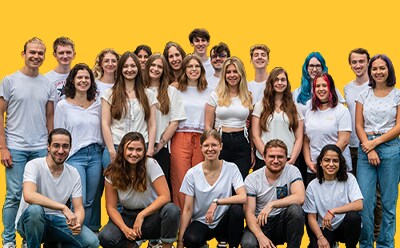TU Darmstadt iGEM team’s Next Great Impossible

The International Genetically Engineered Machine (iGEM) competition is an academic contest in synthetic biology, bringing together aspiring scientists from across the world. iGEM was created by the Massachusetts Institute of Technology (MIT) in 2003 and today is an independent, non-profit organization. Every year, thousands of students gather in Paris for the competition finale, called the Giant Jamboree, to celebrate and share their work.
Since 2012, the Technische Universität Darmstadt has entered teams and in 2021 the iGEM team consisted of 30 students. Eight of these participated in the Next Great Impossible: Alexander Pattberg, Kristina Gasthofer, Marwan Kaufmann, Sidney Mitsch, Leoni von Haza-Radlitz, Maira Bradler, Nicole Rupp and Philipp Münch. Their project, is known by the acronym PHIRE BYRD: “PHage Immune REsponse BY Recognizing Defensive sleeper cells”.
The project team, inspired by the iGEM vision of ‘building a better world with synthetic biology’, developed a bacterial biofilm containing modified Bacillus subtilis cells that release signal-induced specialized phages to kill pathogens. The students had 1 year to work on their chosen topic and could shape the project themselves. This is a great exercise for later research projects in their scientific careers. The project has won the Best Wiki award in the Overgrad segment and was nominated for an award in four other categories including Best Education, Best Integrated Human Practices, Best Software Tool and Best New Application Project.
“To contribute to our scientific knowledge against aging, rising CO2 emissions or the fight against cancer is a cause worth investing my lifetime in.”
– Alexander Pattberg
The team explained that before biofilms can be released, it must be established that they do not cause problems. The use of biofilms for water treatment, the protection of plant roots from parasites, or the synthesis of biochemical products carries the risk of pathogens like Pseudomonas aeruginosa implanting themselves, so the team wanted to design a system that uses risk-free functionalized biofilms. As the potential applications for functional biofilms steadily increase, it is essential to ensure their safety and PHIRE BYRD is a key step in that process.
“I'm fascinated by the question of how scientific knowledge can be used for the greater good.”
– Marwan Kaufmann
Meet the team
- For team member Alexander, there is nothing more impactful than science and engineering. Everything from climate change solutions to rapid responses against future pandemics is dictated by scientific knowledge.
- Back in school, Kristina loved chemistry and looked forward to every lesson so she could learn something new.
- For Sidney, science is not finite – there are so many puzzle pieces to be discovered in order to build a whole picture.
- In the future, Leoni would like to become a responsible and inventive scientist. She doesn’t just want to research for fun, she wants to contribute to an important issue that our world faces. Therefore, it is extremely important for her to conduct her research responsibly and evaluate its effects on society.
- One day, Maira would love to find her place as a scientist in between conservation and regeneration ecology. She thinks it’s important to advocate for those who cannot speak for themselves by pursuing research and quenching her thirst for knowledge. She hopes that one day her scientific contributions will leave a positive impact, however small, on the Earth.
- Nicole is driven to improve people’s quality of life – it doesn’t matter how, she just knows she will achieve this. She sees a need to improve scientific communication to gain society´s trust and understand the fears people might have. Building trust in science is really important and that is why she would like to help bridge the gap between society and scientists.
- Philipp’s goal is to research an area of science that affects the lives of many people; he’s certain that life sciences can help create a better world and believes it is his responsibility to contribute his expertise to this process.
“As we are the next generation of scientists, we are able to actively shape our own futures and the future of science. This is our privilege AND our duty.”
– Leoni von Haza-Radlitz
Congratulations to all 30 students listed below who participated in the 2021 competition as part of the Technische Universität Darmstadt’s iGEM team:
- Alexander Pattberg
- Andrea Aquize
- Antonia Schetle
- Antonia Seidel
- Conny Büchner
- Eileen Popp
- Diana Zakharchuk
- Elisa Ritter
- Emilia Marie Wrede
- Fabian Heinz Günther Ehlers
- Henrik Breitenreicher
- Kai Kabuth
- Kristina Gasthofer
- Leonie von Haza-Radlitz
- Lisa Sorochynska
- Maira Bradler
- Martina Bürkle
- Marvin Mrotzek
- Marwan Kaufmann
- Melina Baur
- Nick Stoffregen
Para seguir leyendo, inicie sesión o cree una cuenta.
¿No tiene una cuenta?